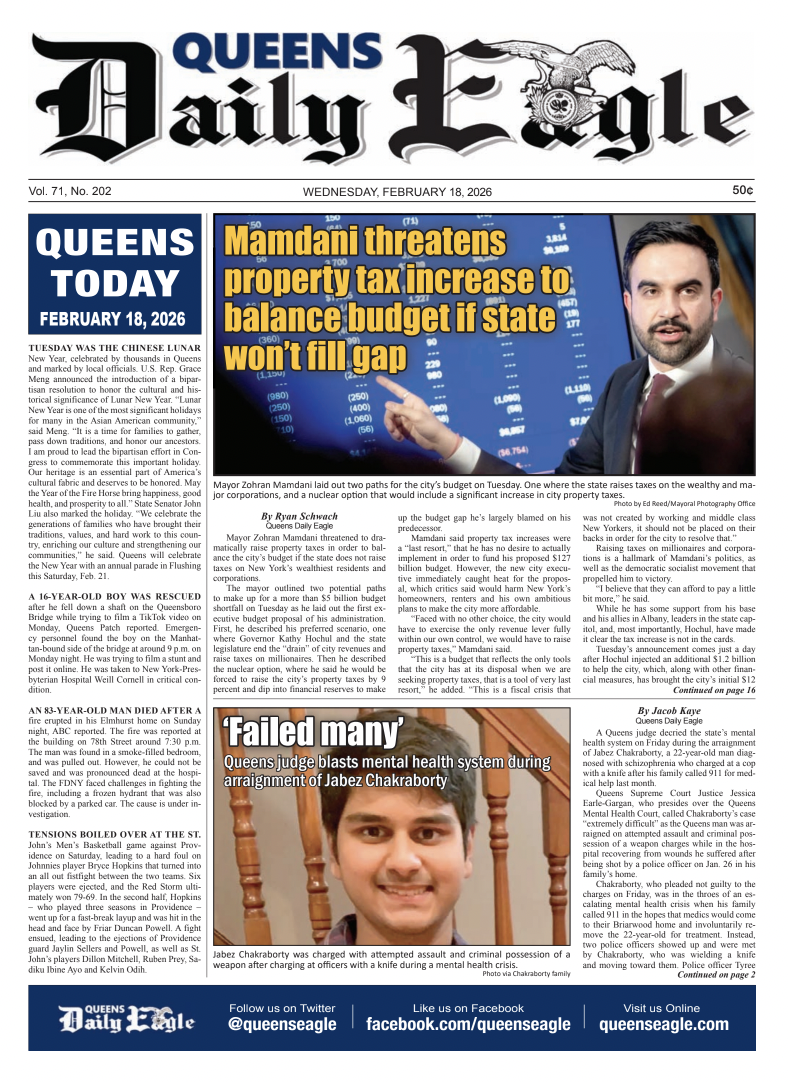Queens BP’s tech hub seeks to bring borough into tech sector
/Queens Borough President Donovan Richards is pushing a new plan for a tech innovation hub to bring access to tech to Queens residents. Photo via Queens Borough President Donovan Richards/Twitter
By Ryan Schwach
In a modern world where technology and, now, artificial intelligence permeates almost every aspect of life, Queens Borough Hall is looking to make sure Queens – in particular its Black and brown residents – keep up with the curve.
During his State of the Borough address earlier this month, Queens Borough President Donovan Richards announced the impending opening of a new diversity technology innovation center in the borough, which will house 50 startups and promote tech entrepreneurship in Long Island City.
“The creation of a diversity tech innovation center is the Queens’ way of bringing economic and technological justice to those who have been long denied,” Richards said, also announcing the $5 million in funding to help identify the first 50 companies to call the space home.
“We're all about putting Queens residents to the jobs of tomorrow,” he said.
The hub is expected to open in January of next year, and will sit on the 33rd floor of a building in Court Square.
The hub is expected to help move along startups led by Black and brown founders, who have for long been left out of the tech fold in the U.S.
Black and brown New Yorkers make up 51 percent of the city's population, but only 22 percent of the city's tech workforce, according to data the BP cited in his State of the Borough address.
“The data is quite damaging and devastating specifically surrounding the systemic problems that it produces, which is, in essence, Black and brown people being at the very bottom of the totem pole here in New York City as it relates to tech,” said Deputy Borough President Ebony Young in a phone conversation with the Eagle.
Young, who has spearheaded the borough president’s tech initiatives, was referring to the data in a report which pushed Richards and his office to do more for Queens’ Black and brown residents in tech, an industry already intertwined with everyday life.
“It's the barbershop, it’s the new restaurant down the street, it's absolutely everything,” she said. “It's the wave of the future…and unfortunately, brown and Black people are already left a few years behind.”
The goal of the tech hub is straightforward: house and fund Black- and brown-owned tech startups, help them grow and help them turn that growth back toward their community.
“This diversity tech hub will be an exchange of growing and scaling,” Young said. “We'll take those 50 to start off with, they will apply…then they will then get the resources, tools and knowledge that they need in order to scale appropriately. In addition to that, they will also receive funding through this process.”
Startups often struggle, not to get off the ground, but to stay off the ground once they get going, which the hub hopes to prevent.
Deputy Queens Borough President Ebony Young has been spearheading Borough Hall’s tech push. Eagle photo by Ryan Schwach
“The problem is these businesses are starting and they're stopping, they're starting and they're stopping,” said Young. “We're looking at this tech hub as a way to inspire people to sustain their businesses right here in New York City, specifically around tech and entrepreneurship.”
The seed for the tech hub, and other tech initiatives the BP has pushed, originated thousands of miles away in the tech-promoting Lagos, Nigeria, which Richards and Young visited last year.
“We live in a whole world full of Black and brown people, so in us doing the research we really looked at who are those Black and brown countries that really stand out in ways that make a difference,” Young said. “With two to three weeks of research, that was Lagos, Nigeria being the ‘Silicon Valley of Africa.’”
On that trip, Young says they were exposed to a world where tech was pushed and promoted by Black individuals, the same type of people who have struggled to make similar inroads in the States.
“The reason why we went to Lagos was that we could not find, on a mass scale, Unicorn level [or startups that reach a $1 billion value or more without being listed on the stock market] brown and Black tech entrepreneurs running companies here in New York City,” said Young.
“As a Black man to step into, on a zoom and see 50 other Black men running tech companies, that's a game changer within itself,” she added. “The exposure to that understanding, the power in that and moving forward in a way that you can feel uplifted through that is important.”
The office hopes to continue that relationship with Lagos, and foster cooperation with Queens-based startups.
The next goal, once companies are getting the help they need and are able to grow in the hub, is that they turn some of that impact back into the community.
“Our social impact component to this is really teaching our Black and brown businesses how to give back…and a lot of times that is not taught,” said Young. “It's just about you get, get, get, get instead of what's reciprocal to your communities. What is the exchange here?”
Young believes that pushing tech in Black and brown communities will help them keep up with the wave of tech and A.I that is everywhere in society.
“The [BP] walks the talk around the future, and Queens is the future…and part of that is really looking into the disparities,” she said.





